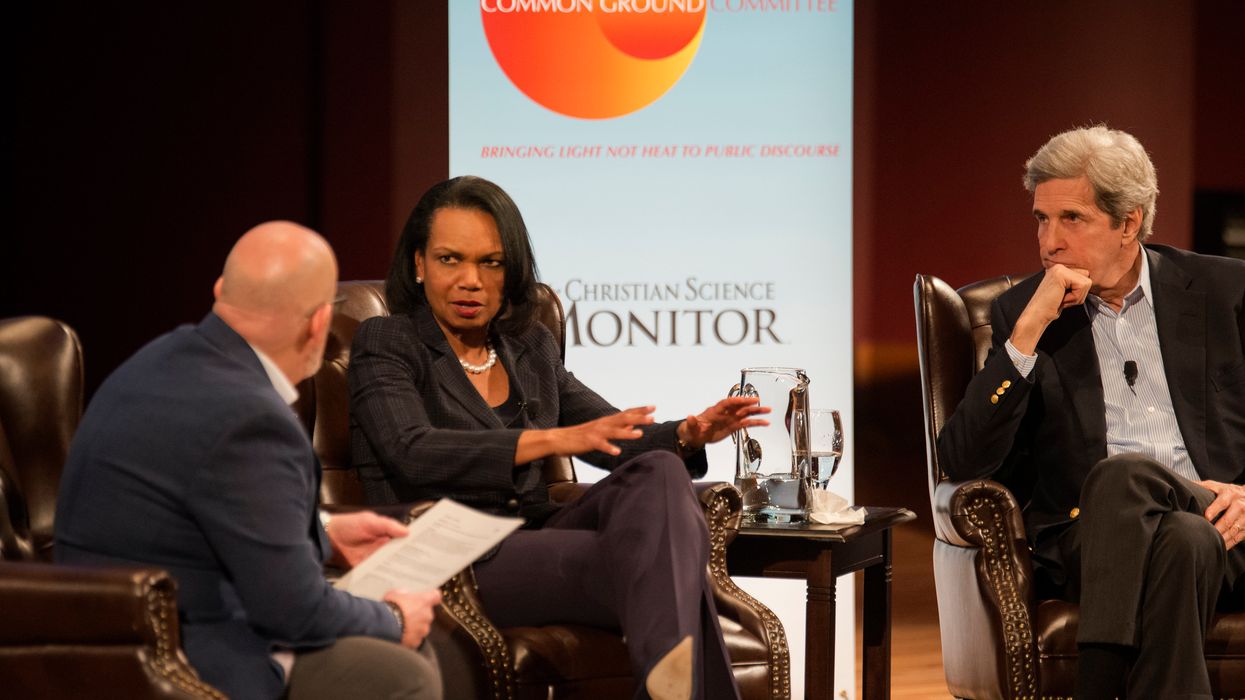Bond and Olsen are co-founders of Common Ground Committee, a nonpartisan organization that seeks to promote productive public discourse.
Turn on any cable news channel and you'll likely hear talk about the divisiveness of our politics, and there are numbers to back that up. Only 38 percent of Americans say the United States is heading in the right direction, and an annual poll tracking discourse shows 93 percent say America has a civility problem. As discouraging as these numbers seem, the tide may be turning.
A recent poll from Georgetown University found that 85 percent of voters want finding common ground to be a main goal of politicians. A survey from Hidden Tribes of America found that 77 percent of Americans believe that the differences between us are not so big that they cannot be bridged.
As the co-founders of Common Ground Committee, we've repeatedly seen this shift first-hand. Whether it's at one of our forums with political leaders or in conversations with family, friends and colleagues, we've found that people actually agree on more than they realize. They just have to engage in the conversation. What's more, people will often share experiences of seeking and finding common ground with those who hold different political beliefs.
Unfortunately, we rarely get the chance to witness agreement between political leaders from different parties. The media portrays politicians as constant adversaries rather than collaborators. This representation has consequences: Research suggests that negative feelings toward the opposite party's leadership are much stronger than those directed at individuals.
That's why it's important to show the country that leaders from the two parties can agree — and not just on "little stuff." When that happens, you can instantly see people light up. When we held a public forum earlier this year at the University of Notre Dame, the campus was abuzz after seeing former Secretaries of State John Kerry and Condoleezza Rice find consensus on a wide range of issues. Students walked in prepared to see them search for grains of agreement, but instead saw consistent agreement on issues including North Korea, climate change and Middle East policy. Following the event, students told us they would have assumed the Democrat Kerry and the Republican Rice were from the same political party if they hadn't known better.
At a striking point in the forum, Rice provided an in-depth explanation of her views on immigration policy. Kerry had a two-word response: "I agree."
Mainstream media rarely represents this aspect of our political leaders' lives: the vast areas of agreement, compromise and collaboration that go into productive governing.
We recognize that healthy debate is necessary for a democracy; Kerry and Rice certainly didn't agree on everything. Their perspectives differed sharply when the conversation turned to what to do about voter suppression. Still, the respect and rapport they had established earlier remained firmly intact and they kept their disagreement focused on the issues, not each other.
There's very little of this type of collegiality found in discussions that focus on rapid-fire debates, and this colors the way citizens view politics.
The more we see political leaders engaging civilly and empathetically with ideologies different from their own, the more the American people will be inspired to do the same. Earlier this year, Mayor Pete Buttigieg of South Bend, In., participated in a town hall on Fox News, even though the Democratic presidential candidate knew he was communicating his policy stances not to a partisan base, but to an audience of over 2.5 million assumed to be completely antithetical to his approach. Former Republican Sen. Jeff Flake of Arizona started a series for CBS highlighting areas of political unity for Democrats and Republicans. What this signals: Viewers from both sides of the aisle want to see more than polarization from their news sources.
When we get lost in the rhetoric of polarization, we forget that we're all on the same team. We're all Americans. While we have different ideologies and beliefs that should not be compromised, there is more that brings us together than drives us apart. The more those points of common ground are found by leaders — and highlighted in the media — the better chance we have to heal the anger and polarization that weaken our nation.



















